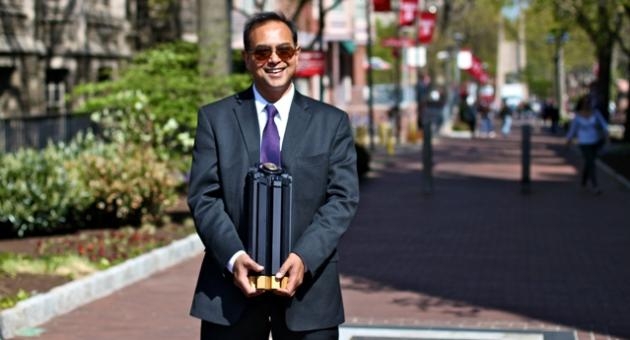Fox strategy professor is known for his passion and distinct point of view
Mitrabarun "MB" Sarkar, 2013 Temple University Great Teacher Award Winner

For Fox School of Business Professor Mitrabarun Sarkar, teaching is more than a career — it's a calling, a moral imperative that drives him to continually understand what will make a true impact on his students both professionally and personally.
His dedication becomes evident each night as he prepares for the next day’s classes. Despite years of experience in front of the classroom, he still feels nervous as he contemplates the material and how to most effectively convey it to his students.
“I think it’s because I really believe that every class should make a difference,” said Sarkar.
It’s that level of investment that has led to his selection as a recipient of Temple’s 2013 Great Teacher Award.
Known to students and colleagues as “MB,” Sarkar serves as a professor of strategy and innovation and Stauffer Research Fellow, with research interests in strategic innovation and global strategy. The award is the latest among several accolades he has earned since joining Temple in 2008. He won Outstanding Professor of the Year awards in 2009, 2011, and 2013 from Fox’s Professional MBA program; in 2011 from the inaugural cohort of the Online MBA program; and in 2012 from the Executive MBA program.
The underpinnings of Sarkar’s success date to his upbringing in Calcutta, India, the cultural and educational center of East India.
“Those days were quite a struggle because the idea was, if you’re a son, you have to be an engineer or doctor,” said Sarkar. “I wanted to study the liberal arts and economics — the social sciences.”
Sarkar’s father was perplexed, but with encouragement from his mother supported him as he traveled to Delhi to study economics at St. Stephen’s College before being accepted to the prestigious India Institute of Management, Ahmedabad.
Upon completion of his MBA, Sarkar joined an Indian conglomerate.
“It was a time when India was just starting to feel the winds of change, mostly internally through civil movements. The country was opening up, liberalization was just about to set in, technology was being embraced and aspirations were forming,” said Sarkar.
Importantly, television, which was government controlled, was starting to open up to the private sector. Sarkar applied for, and received, a broadcasting license from the government, becoming one of the first private producers for television in India. Sarkar owned a studio, ran multiple productions for TV and became involved in the corporate sector for organizations.
But after seven years growing his entrepreneurial venture, he needed a change.
“I felt the urge to do something different, to be really good at what I do, to make a bigger impact on the world,” said Sarkar.
With support from his wife, Tanu, he decided to pursue his dreams and came to the U.S. to pursue his doctoral studies. After finishing his Ph.D. at Michigan State University, Sarkar started teaching at University of Central Florida, shifting his focus from marketing to strategy. After several years, he “looked around and saw that the world had changed.”
“In 2003, traveling to India completely boggled my mind,” he said. “I saw a developing country, with sky-high aspirations and a sense of belief. It was leapfrogging technology, overcoming incredible hardships and undertaking institutional, financial and cultural transformation, all under a relatively weak governance system.”
He wondered, “How can the Western world learn from this experience? How is it possible to do so much more with so much less?”
He began to spend more time in India, seeking to understand the transformation underway.
“I found myself learning and changing,” he said. “I felt I had to contribute to this, and bring back the story of innovation in emerging markets to my students. That’s when things started to change, when I started to get passionate about a core set of ideas around frugal innovation, its power to create inclusive growth and shared value where one can do well by doing good.”
Sarkar brought that core set of ideas to Temple when he joined Fox.
“As a professor, it is critical to bring a distinct point of view into the classroom,” said Sarkar. “You need to be passionate about it — that is the only way that you can really make a difference. Of course, you have to make it fun and interesting, or it will not work.”
Aside from the numerous accolades Sarkar has earned during his time at Temple, his greatest honor comes from his students.
“I have been fortunate to have been taught by Nobel laureates, Pulitzer Prize winners, well-known authors and other assorted thought leaders,” wrote Aron Wahrman, associate professor of plastic surgery in Temple’s School of Medicine, who studied under Sarkar at Fox. “Nothing and no one prepared me for the incredible talents of Dr. Sarkar.”
“Nearly all of his students consistently point to his subject-area knowledge (both breadth and depth), his passion, the distinct perspectives he brings to each class, his insistence on students questioning and reflecting on the subject matter before forming their own viewpoints, and, most important, his caring and generous personality,” said Sarkar’s colleague Seok-Woo Kwon, assistant professor in Strategic Management in the Fox School of Business.
“Temple has been incredibly good to me,” said Sarkar. “It’s an environment which has really believed in me. It has given me the resources to nurture my passion, and the creative freedom to experiment and spend time in my learning laboratories in emerging markets. I believe I’m here to make a difference at Temple.”
“My father’s last words to me before he passed were “teach well,” said Sarkar. “This one is for him.”